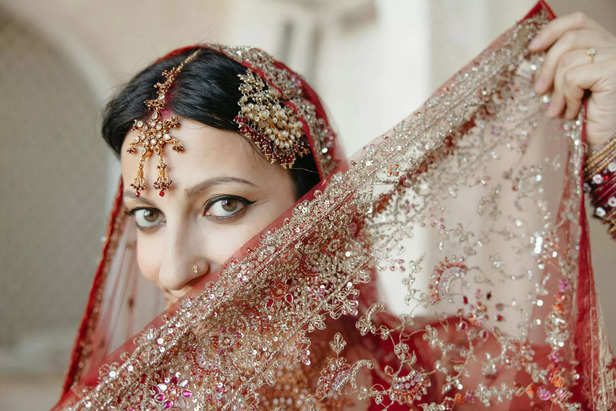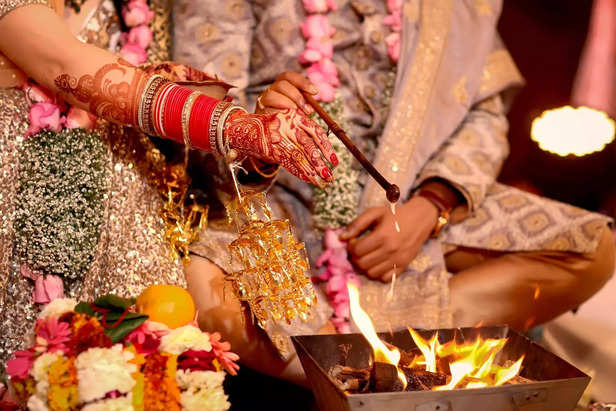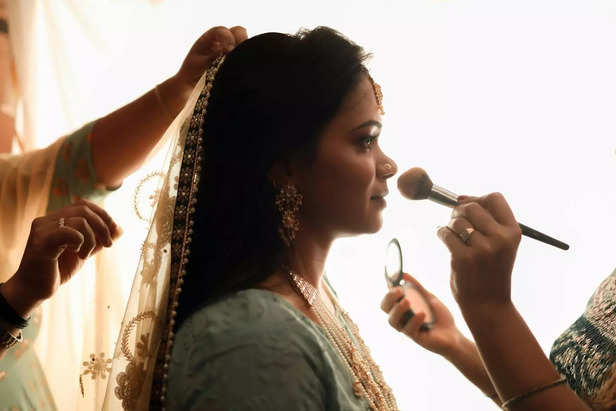Fair Enough? The Unspoken Pressure on Indian Brides to Look Whiter
Riya Kumari | Mar 24, 2025, 23:54 IST

( Image credit : Pexels )
So, here’s the thing. You can be a modern, educated, feminist, self-aware woman with a skincare routine based on hydration, not desperation. You can have a perfectly functional relationship with your melanin. But the minute the words wedding and bride enter the chat, BOOM—suddenly, your complexion is everybody’s business. Because, in India, if you’re not glowing like a fluorescent tube light on your wedding day, are you even married?
A wedding is supposed to be about love, about the coming together of two people, two families, two futures intertwined. But in the Indian bridal industry, there’s an unspoken requirement, a silent checkbox that still lingers like an outdated superstition: She must look fairer. Not happier. Not healthier. Fairer. This expectation isn’t always stated outright. Nobody declares, "You must change your skin tone before you get married." That would be too obvious, too crude. Instead, it comes in the form of suggestions, beauty tips, concern disguised as love. “Try this ubtan for a natural glow.” “This facial will brighten your complexion.” “Let’s pick a foundation that enhances your look.” The enhancement, of course, is always lighter, never darker.
1. A Legacy of Tinted Mirrors

Why does this still exist? Why does skin tone remain a wedding-day preoccupation when we have supposedly "moved past" colorism? The truth is, we haven’t. We’ve just learned to repackage it in softer language. India has a deep-rooted history with fairness. Colonialism didn’t introduce it, but it certainly reinforced the idea that lighter skin meant higher status. Caste hierarchies pushed the same narrative—those who worked under the sun were darker, those who ruled from shaded halls were lighter. Add centuries of conditioning through media, matrimonial ads, and beauty standards, and we’ve inherited a problem that doesn’t need words to exist. It operates in whispers, in expectations we barely question anymore.
A bride may not be explicitly told to lighten her skin, but she knows. She knows because fairness cream ads still run on TV. Because wedding photographers "adjust" skin tones to fit a pre-approved aesthetic. Because a deep, instinctive part of her has been taught that she will look better—which always means fairer—on the most important day of her life.
2. The Silent Approval of Colorism

It’s easy to assume this issue is just about brides and their families, but let’s go a little deeper. The wedding industry thrives on insecurity. There’s an entire economy built on making a woman feel like she is not quite good enough as she is. Not slim enough, not tall enough, not fair enough.
Makeup artists often default to lighter foundations—not because they consciously believe in fairness, but because that’s what has always been done. Wedding photographers edit out melanin as though it's a flaw. Families see it happening and accept it because why not? The result? A bride who looks at her wedding album and doesn’t recognize herself, but has been conditioned to believe she should be grateful. And here’s the dangerous part: when a bias becomes tradition, it no longer needs justification. It exists as an unquestioned truth.
3. What Happens When We Stop Playing Along?

Imagine a different reality. One where a bride’s biggest concern is the marriage, not the fairness of her skin. One where makeup artists ask, "What shade suits you best?" instead of assuming. One where wedding photos reflect real skin tones, where beauty isn’t artificially enhanced but naturally embraced. This isn’t just about fighting an outdated mindset—it’s about freeing an entire generation from a silent, persistent pressure they were never meant to carry.
So, to every bride who has ever felt the need to alter herself to be "worthy" of her own wedding: You are not responsible for someone else’s limited idea of beauty. You don’t need to fit into a shade card to be celebrated. You don’t need to be "fair enough" to be loved. You are enough. Exactly as you are.
1. A Legacy of Tinted Mirrors

Indian Bride
( Image credit : Pexels )
Why does this still exist? Why does skin tone remain a wedding-day preoccupation when we have supposedly "moved past" colorism? The truth is, we haven’t. We’ve just learned to repackage it in softer language. India has a deep-rooted history with fairness. Colonialism didn’t introduce it, but it certainly reinforced the idea that lighter skin meant higher status. Caste hierarchies pushed the same narrative—those who worked under the sun were darker, those who ruled from shaded halls were lighter. Add centuries of conditioning through media, matrimonial ads, and beauty standards, and we’ve inherited a problem that doesn’t need words to exist. It operates in whispers, in expectations we barely question anymore.
A bride may not be explicitly told to lighten her skin, but she knows. She knows because fairness cream ads still run on TV. Because wedding photographers "adjust" skin tones to fit a pre-approved aesthetic. Because a deep, instinctive part of her has been taught that she will look better—which always means fairer—on the most important day of her life.
2. The Silent Approval of Colorism

Indian wedding
( Image credit : Pexels )
It’s easy to assume this issue is just about brides and their families, but let’s go a little deeper. The wedding industry thrives on insecurity. There’s an entire economy built on making a woman feel like she is not quite good enough as she is. Not slim enough, not tall enough, not fair enough.
Makeup artists often default to lighter foundations—not because they consciously believe in fairness, but because that’s what has always been done. Wedding photographers edit out melanin as though it's a flaw. Families see it happening and accept it because why not? The result? A bride who looks at her wedding album and doesn’t recognize herself, but has been conditioned to believe she should be grateful. And here’s the dangerous part: when a bias becomes tradition, it no longer needs justification. It exists as an unquestioned truth.
3. What Happens When We Stop Playing Along?

Bridal makeup
( Image credit : Pexels )
Imagine a different reality. One where a bride’s biggest concern is the marriage, not the fairness of her skin. One where makeup artists ask, "What shade suits you best?" instead of assuming. One where wedding photos reflect real skin tones, where beauty isn’t artificially enhanced but naturally embraced. This isn’t just about fighting an outdated mindset—it’s about freeing an entire generation from a silent, persistent pressure they were never meant to carry.
So, to every bride who has ever felt the need to alter herself to be "worthy" of her own wedding: You are not responsible for someone else’s limited idea of beauty. You don’t need to fit into a shade card to be celebrated. You don’t need to be "fair enough" to be loved. You are enough. Exactly as you are.
